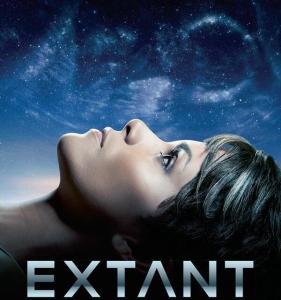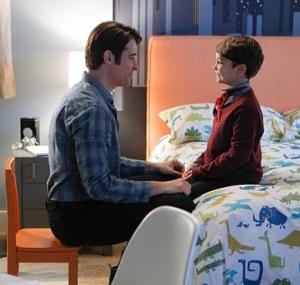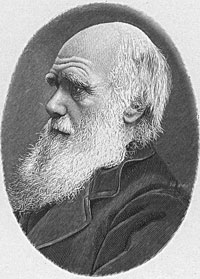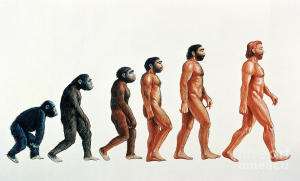
It’s hard to find new TV shows to watch during the summer rerun season, especially if, like me, you enjoy intelligent science fiction. I hoped Halle Berry’s new CBS show, Extant, might be one I could get into. The premise is that her character, Molly, is an astronaut recently returned to Earth (to her roboticist husband, played by Goran Visnjic, and their android son, Ethan) after a 13-month solo mission on a space station.
Again, it was a solo mission. But in her re-entry physical after landing, she and her doctor discover she’s somehow pregnant.
I didn’t care for the pilot episode. It suffered from the clichés of dreamy mysticism and secretive, suspicious-acting bureaucrats that TV people resort to when they try to make near-future, kinda-sorta “hard science fiction” interesting, but don’t really know how. They seem to believe they need to resort to supernatural elements to replace the warp drives and extraterrestrials they’re leaving out. Another recent failed show, Defying Gravity, made similar mistakes.

However, pilot episodes are often weak outings; the producers and actors are still getting their feet under them and figuring out what works and what doesn’t. I decided to stick with the show, and recently queued up the second episode, titled “Extinct.”
In this episode, Molly comes along with Ethan on a school field trip to visit a natural history museum (clearly modeled after, if not actually filmed at, the American Museum of Natural History in Manhattan). I should explain that Molly’s husband believes in raising and educating Ethan, who is a prototype artificial intelligence built to look like a middle-school-aged boy, just like other children. He thinks this will make him and his kind more empathetic toward humans. So he’s in school with other kids his apparent age.
Observing an exhibit about hominid species, including Neanderthals, Ethan meets a robot docent that looks like a squat vending machine. Why a docent built to converse with children looks like this, when just moments earlier we saw Ethan and his classmates interacting with an utterly convincing holographic elephant, is a mystery the show probably didn’t intend. But anyway, Ethan has this conversation with the docent:
Infobot: Please step back. The chain of evolution is not an interactive display. I see you are interested in the Neanderthal. I can tell you more about him if you like.
Ethan: Okay.
Infobot: Neanderthal Man went extinct about 30,000 years ago.
Ethan: Extinct?
Infobot: “Extinct” is to no longer exist.
Ethan: Why did they go extinct?
Infobot: Extinction happens for many reasons. In almost all cases, strong species survive, and the weak ones die. It’s called “survival of the fittest.”
Ethan: What happened to the Neanderthal?
Infobot: Homo sapiens came to Eurasia, where the Neanderthals lived, and they were better able to survive because they were stronger and smarter.
… And that’s when I stopped watching and swore off the show for good. I won’t lend my eyes or my time to a science fiction show that’s so aggressively, stupidly bad at its science.
I’ll elaborate, but first, a tangent: “extinct” is an adjective. The infobot should have said either “‘Extinct’ means ‘no longer existing'” or “To be ‘extinct’ is to no longer exist.” A museum as well-funded as this one clearly was could have afforded better writers (or grammar software) for its robots. I can forgive much in fictional narratives (if I couldn’t, I’d never watch anything), but poor usage from characters that should know better is a bridge too far (If you ever see me in person, don’t get me started on Elrond’s use of “from whence” in the movie Lord of the Rings: The Fellowship of the Ring.).
Okay, moving on. Let me repeat this line from the infobot:
Extinction happens for many reasons. In almost all cases, strong species survive, and the weak ones die. It’s called “survival of the fittest.”
That is a cartoonish mischaracterization of the concept of “survival of the fittest.” It does not mean “the strong outlast the weak.” That is the straw-man argument that’s been used by sociologists and politicians to bash (or, tragically, to extol) Darwin’s theory for almost a century and a half. The mechanism of natural selection does not depend on one species being “stronger” or “better” than another. Rather, it’s to be found right there in the last word of the phrase. “Fittest” simply means “the best fit.” Like a glove that’s neither too tight nor too loose on your hand. Larger or smaller gloves aren’t bad gloves; they’re just not the ones that go best with your hands.

Replace “hands” with “ecological niche” and “gloves” with “species.” I’ve never forgotten the way Dr. William Barstow, my biology professor at the University of Georgia, explained this concept. Before he became a college professor, Dr. Barstow had been a high school science teacher. In that role, the day before he taught evolution each year, he’d go out onto the school’s lawn and scatter hundreds of red, blue, yellow, and green toothpicks. Then, the next day, he sent his students out with buckets and the charge to gather up as many toothpicks of each color as they could find.
Of course the kids always came back with very, very few green toothpicks relative to the other colors. If the high school students were predators and the toothpicks prey, the green toothpicks weren’t “stronger” or “better” in any objective way than the other toothpicks; they were simply the best fit for the environment of a field of green grass. If they were a reproducing species, the green toothpicks would have the most offspring, and over time the other toothpicks would disappear entirely.
It’s for the same reason that brown bears that migrated to the far north turned white and became polar bears. It’s also why there are no short-necked giraffes, and why anteaters have sticky tongues. Each species evolved in an environment where those particular qualities gave them a slight reproductive advantage over their relatives who didn’t have those qualities. They ate a little better, so they lived a little longer and produced a few more offspring.
(Also, not to get too deep into the weeds, but it’s actually the genes for white fur, long necks, and sticky tongues that won out over time, not the polar bears, giraffes, and anteaters themselves, but that’s getting a little abstract for most people to readily conceptualize.)
I emphasize the “slight” reproductive advantage because that’s all it needs to be. The difference can be as small as a few tenths of a percent; over enough generations that’s sufficient for the individuals of the species with the advantage to completely replace the ones without it. There’s no “struggle.” The prevailing species isn’t “stronger.” It’s just a better fit, and that fitness becomes fine-tuned over thousands or millions of years.
This is a broad-strokes description of how natural selection works. There are exceptions and caveats, of course. For example, sometimes extinctions happen due to outside, unpredictable factors, like asteroid strikes, that make fitness to previously prevailing conditions irrelevant. But generally speaking, extinction and speciation happen as detailed above.
Hold that thought. The show then compounded its insult to science with this howler:
Homo sapiens came to Eurasia, where the Neanderthals lived, and they were better able to survive because they were stronger and smarter.
We don’t know, today, why the Neanderthals went extinct, and it’s doubtful we will ever know why; certainly not by the unspecified time of Extant. It’s possible we deliberately killed them off, but it’s also possible the two interbred, and today’s modern humans are a hybrid of the two species or subspecies (there’s even a growing consensus that we were not fully distinct species from each other).
Their extinction does roughly coincide (on a geologic timescale; we coexisted for thousands of years) with modern humans’ appearance in the same geographic areas, but that doesn’t mean there was direct conflict, or that we were so much more clever and resourceful that we hunted and ate their mammoths and gathered their berries before they could.
The Neanderthals themselves could well have been “smarter and stronger,” or at least equal to us in brains and brawn, and they died out simply because they had a lower average birthrate; again; the difference doesn’t have to be big at all. Even if the Neanderthals had 999 births for every 1,000 Homo sapiens births, over hundreds of generations that would be a sufficient difference to drive them to extinction.
Another possibility is that the climate changed in a way the Neanderthals were less able to cope with than modern humans.
The point is we don’t know, and probably never will. These aren’t new hypotheses; I was introduced to most of them almost twenty years ago when I read The Neandertal Enigma by James Shreeve.

It’s simply offensive for a TV show set in the future to display such ignorance. I verified the information in this post with a few minutes’ Googling. There’s no reason Extant‘s writers couldn’t have done the same, if they’d cared to. The show’s CBS network-mate The Big Bang Theory has a staff physicist who famously makes sure all the physics and astronomy presented in the show are accurate and up to date. If a sitcom for which science is just a backdrop can take its accuracy so seriously, there’s no excuse for a science fiction drama not to do the same. And this is basic science. Dr. Barstow was a great college professor, but remember, the example he used to illustrate natural selection was one he’d originally used for high school classes.
Of course, I get where the writers were going: Ethan will begin to wonder if maybe he’s better than his Homo sapiens progenitors, just as they themselves were “better” than their own forebears, and will go Magneto on us, or choose not to. But they didn’t need to dumb down the science to tell that story. Better writers would have found another way.
The show’s ratings have not been high, so its misrepresentation of science probably won’t matter much in the long run. But it still should be unacceptable, especially in a nation currently wringing its hands over a perceived crisis in STEM (science, technology, engineering, and math) education. I’m not alone in this, right?
